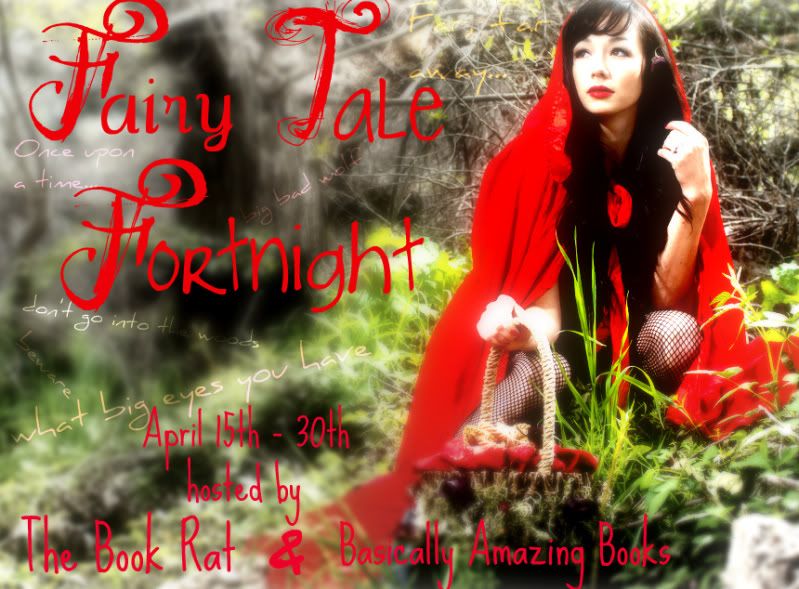
So I really wanted to participate in FTF, but, alas, April is also Script Frenzy and I didn't plan enough ahead too. So, I'm going to unofficially partcipate, and those reading, check out the The Book Rat's Fairy Tale Fortnight Line-Up.
So I'm going to start my FTF post with some Food for Thought: Cinder.
Last week, Marissa Meyer released discussion questions for Cinder. I didn't contribute any questions, because, well, I couldn't think of them at the time. But, being the big fan that I am (besides absolutely loving the book, Marissa Meyer is my hero), and because some of the questions I've actually discussed myself with friends and family, I thought I'd share some of my thoughts on my favorite questions.
3. Cinder has many unique abilities—the ability to detect lies, to download information directly into her head, to overlay her eyesight with helpful diagrams, etc. What kinds of abilities might we want to develop from future technology? What cyborg skill would you like to have today?
The cyborg question: Ok, I'll admit, this is the biggest logic fault for me. I'm assuming that Ms. Meyer has thought about this, and I just don't know the answer because, well, it's not pertenant. If there is such discrimination against cyborgs (who have really awesome super powers), why would anyone become a cyborg??? My choices are death, palatalization, or becoming something that's not even a citizen anymore? Is it really better than death if you escape death just to be drafted and killed with the plague draft??? Many stories talk about how freedom and human rights are noble - a cause worth dying for. Is a life as a cyborg really better than death?
Actually, I think that if (well, when) cyborgnetics become that advanced we will develop two social status - those with enhanced parts and those without. There will be an eletisim for those who are pure, but I can aslo imagine that would exsist for those who are cyborgnetic. I think there would be discrimination, but not a class division.
4. In Cinder’s future, Earth has been conglomerated into six countries who have formed an alliance called the Earthen Union. Though Cinder lives in Asia (the Eastern Commonwealth), there is much evidence of western influence (ex., the ball gowns that are made for Peony and Pearl). Do you think this mixing of cultures is a believable result of the Earthen Union? How do you foresee cultures changing (or not) as a result of the increased communication and travel we have access to today?
This is my favorite part of the book - globalization! This is a real socio-economic-political theory! I adored that this world considers the world as a whole, and that there are different, even if it's just slightly, factions in the world. Having one truely homegenous culture in sci-fi always, always, bothered me.
Yet, we are on track for losing the majority of our culture and beoming on homengeous community. Yes, there will still be cultural quirks, but, I do believe that influences would strech that far. I live in New Orleans, which has an alarmingly strong and not traditionally American culture, but I can see that as my generation grows, that culture is really fading and turning into the standard American culture. We're loosing our slang, our festivals, our flavor. Some of this homengenation is good, but some of it is sad. Yes, it's still here, but not like it was 10, 20, or 50 years ago.
9. Was it right for Cinder to try to deliver the antidote to Peony first, even though there were others who also needed it? Was it right for Dr. Erland to offer her first access to the antidote? What would you have done in either situation?
This is an interesting question. As a writer, I know why this action worked out the way it did. Cinder is our hero. Her first goal was finding a cure for Peony. So, logicially, from a narrative POV, Peony is the only one who could recieve the antidote. When I was reading this, I didn't think anything of it. It wasn't until I started talking with someone I lent the book to that I the moral question was raised.
The reader disassociated with Cinder because of this action. She thought it was cruel and selfish of Cinder to believe that her sister was deserving of the cure when so many other were suffering. She also blamed Dr. Erland for offering it to Cinder, but Dr. Erland is already a bit of an morally ambigious character, so it was less bothersome. I hadn't thought about it that way before.
Those are my favorite questions, but there are a lot of food for thought among the questions. If you read Cinder, check out the questions and tell me what your answer would be.
So, this is part 2 of this post, and I'm going to list my favorite Fairy Tale adaptations!
(So add all of these to your reading list if you haven't already...)
1. Cinder - Ok, so no one's surprised by this. Sci-fi, cyborg Cinderella of pure awesomeness.
2. A Long, Long Sleep - Another Sci-fi tale, but this one is Sleeping Beauty. There are so many layers of awesomeness in this book, I just can't describe it. But I can say, the story really starts after the kiss...
3. A Tale Dark and Grimm - Hansel and Gretel is just the beginning of this fun and well written fairy tale collection. There's an interrupting narrator, who makes this book awesome, and they way Hansel and Gretel are woven into various tales in unique ways.
4. Howl's Moving Castle - So technically, not based on any particular tale, but Jones weaves her own unique fairy tale that's just as good as any predecessor.
5. Cloaked - The most fun fairy tale mash-up I've ever read! It's a mix of the Frog Prince, and The Salad, and the Swan Brothers tale that I can't quite remember. It's a fun run, and my favorite of Flinn's books.
6. Briar Rose - A contemporary retelling of Sleeping Beauty involving the Holocaust. Yolen is amazing at weaving history and fable together.
7. Black Thorn, White Rose - A short story anthology (the only one in the series I've been able to get my hands on) that's really cool. There's an awesome "Godfather Death" story, and a frog pricne with a Sci-Fi twist, plus a chilling Sleeping Beauty...
8. The Sun - A very literary and poetic book, but so far the only Little Red Riding Hood I seem to love.
So there we have it, my FTF forrary.
Oh, and in case you were wondering....




